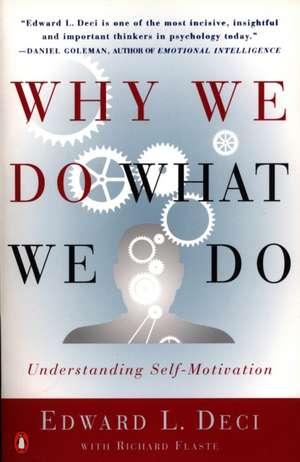Why We Do What We Do: Understanding Self-Motivation
Autor Edward Deci, Richard Flasteen Limba Engleză Paperback – 31 iul 1996 – vârsta de la 18 ani
If you reward your children for doing their homework, they will usually respond by getting it done. But is this the most effective method of motivation? No, says psychologist Edward L. Deci, who challenges traditional thinking and shows that this method actually works against performance. The best way to motivate people—at school, at work, or at home—is to support their sense of autonomy. Explaining the reasons why a task is important and then allowing as much personal freedom as possible in carrying out the task will stimulate interest and commitment, and is a much more effective approach than the standard system of reward and punishment. We are all inherently interested in the world, argues Deci, so why not nurture that interest in each other? Instead of asking, "How can I motivate people?" we should be asking, "How can I create the conditions within which people will motivate themselves?""An insightful and provocative meditation on how people can become more genuinely engaged and succesful in pursuing their goals." —Publisher's Weekly
Preț: 95.95 lei
Nou
Puncte Express: 144
Preț estimativ în valută:
18.36€ • 19.07$ • 15.25£
18.36€ • 19.07$ • 15.25£
Carte disponibilă
Livrare economică 11-25 ianuarie 25
Preluare comenzi: 021 569.72.76
Specificații
ISBN-13: 9780140255263
ISBN-10: 0140255265
Pagini: 240
Dimensiuni: 129 x 202 x 12 mm
Greutate: 0.17 kg
Editura: Penguin Books
ISBN-10: 0140255265
Pagini: 240
Dimensiuni: 129 x 202 x 12 mm
Greutate: 0.17 kg
Editura: Penguin Books
Cuprins
Why We Do What We Do One
Authority and Its Discontents
Part One: The Importance of Autonomy And Competence
Two
I'm Only in It for the Money: Early Experiments on Rewards and Alienation
Three
The Need for Personal Autonomy
Four
Intrinsic and Extrinsic Motivation: The Yields of Each
Five
Engaging the World with a Sense of Competence
Part Two: The Role Of Interpersonal Connectedness
Six
The Inner Force of Developement
Seven
When Society Beckons
Eight
The Self in a Social World
Nine
When Society Corrupts
Part Three: How It All Works
Ten
How to Promote Autonomy
Eleven
Promoting Healthy Behavior
Twelve
Being Autonomous Amidst the Controls
Part Four: Conclusion
Thirteen
The Meaning of Human Freedom
Notes on Works Cited
List of Research Articles
Index
Authority and Its Discontents
Part One: The Importance of Autonomy And Competence
Two
I'm Only in It for the Money: Early Experiments on Rewards and Alienation
Three
The Need for Personal Autonomy
Four
Intrinsic and Extrinsic Motivation: The Yields of Each
Five
Engaging the World with a Sense of Competence
Part Two: The Role Of Interpersonal Connectedness
Six
The Inner Force of Developement
Seven
When Society Beckons
Eight
The Self in a Social World
Nine
When Society Corrupts
Part Three: How It All Works
Ten
How to Promote Autonomy
Eleven
Promoting Healthy Behavior
Twelve
Being Autonomous Amidst the Controls
Part Four: Conclusion
Thirteen
The Meaning of Human Freedom
Notes on Works Cited
List of Research Articles
Index
Notă biografică
Edward L. Deci, Ph.D., professor of pyschology at the University of Rochester, is director of its human motivation program.
Richard Flaste, former Science and Health Editor of The New York Times, led the team that won the Pulitzer Prize for national reporting in 1987.
Richard Flaste, former Science and Health Editor of The New York Times, led the team that won the Pulitzer Prize for national reporting in 1987.
Descriere
If you reward your children for doing their homework, they will usually respond by getting it done. But is this the most effective method of motivation? No, says psychologist Edward L. Deci, who challenges traditional thinking and shows that this method actually works against performance. The best way to motivate people—at school, at work, or at home—is to support their sense of autonomy. Explaining the reasons why a task is important and then allowing as much personal freedom as possible in carrying out the task will stimulate interest and commitment, and is a much more effective approach than the standard system of reward and punishment. We are all inherently interested in the world, argues Deci, so why not nurture that interest in each other? Instead of asking, "How can I motivate people?" we should be asking, "How can I create the conditions within which people will motivate themselves?""An insightful and provocative meditation on how people can become more genuinely engaged and succesful in pursuing their goals." —Publisher's Weekly











